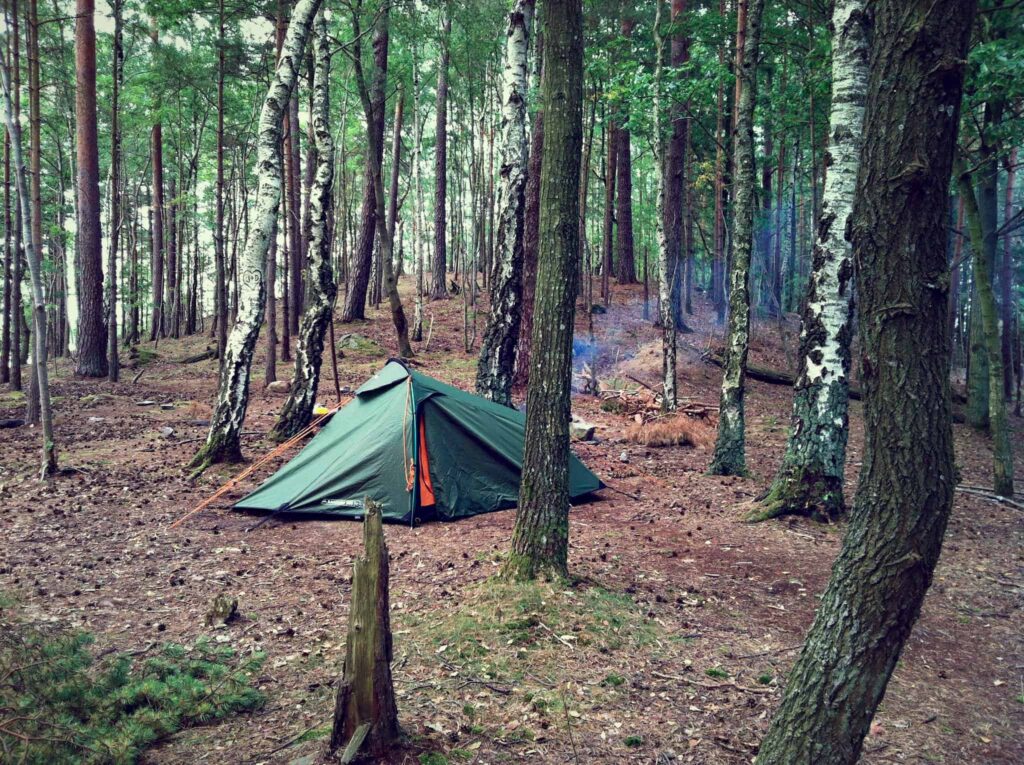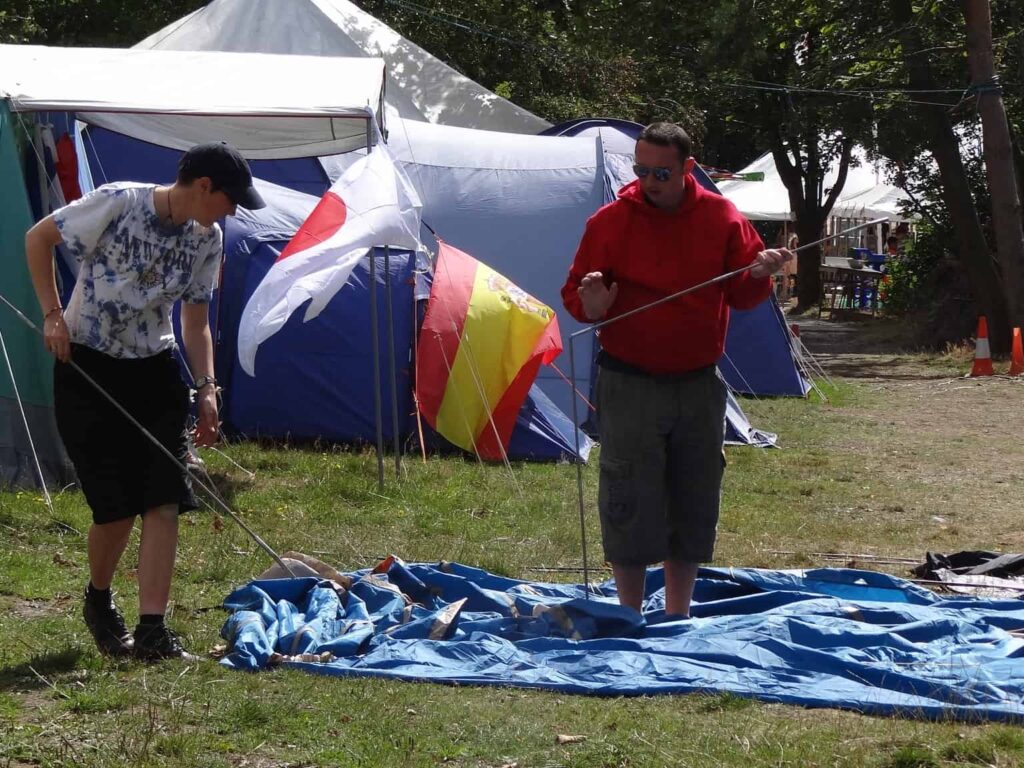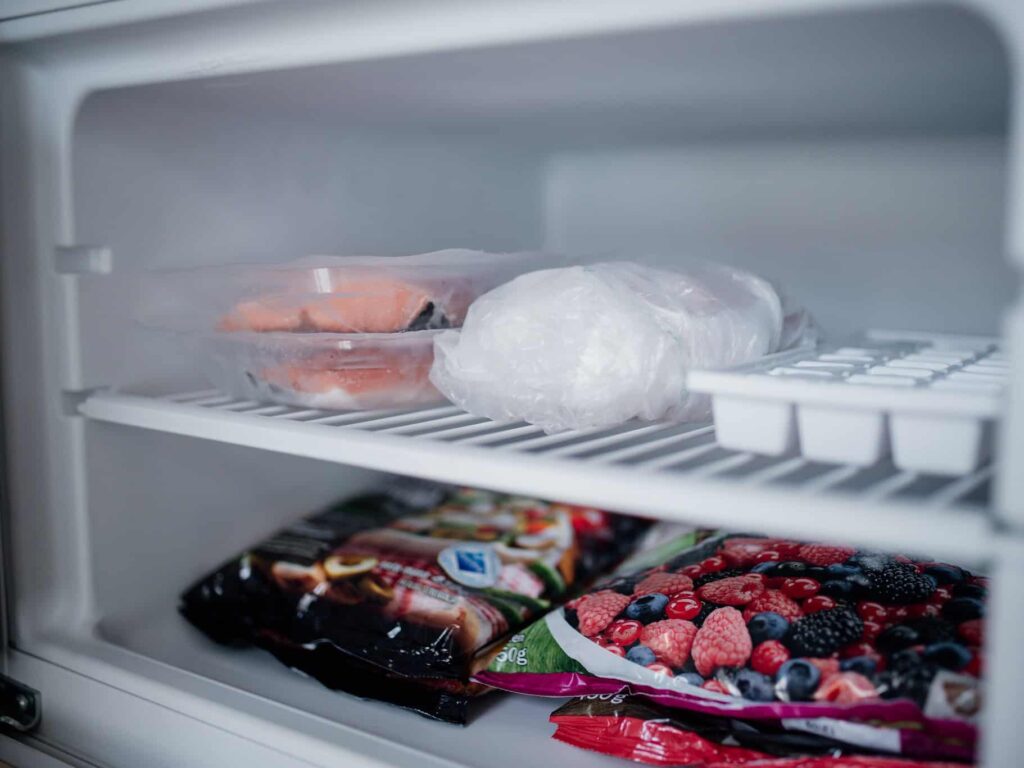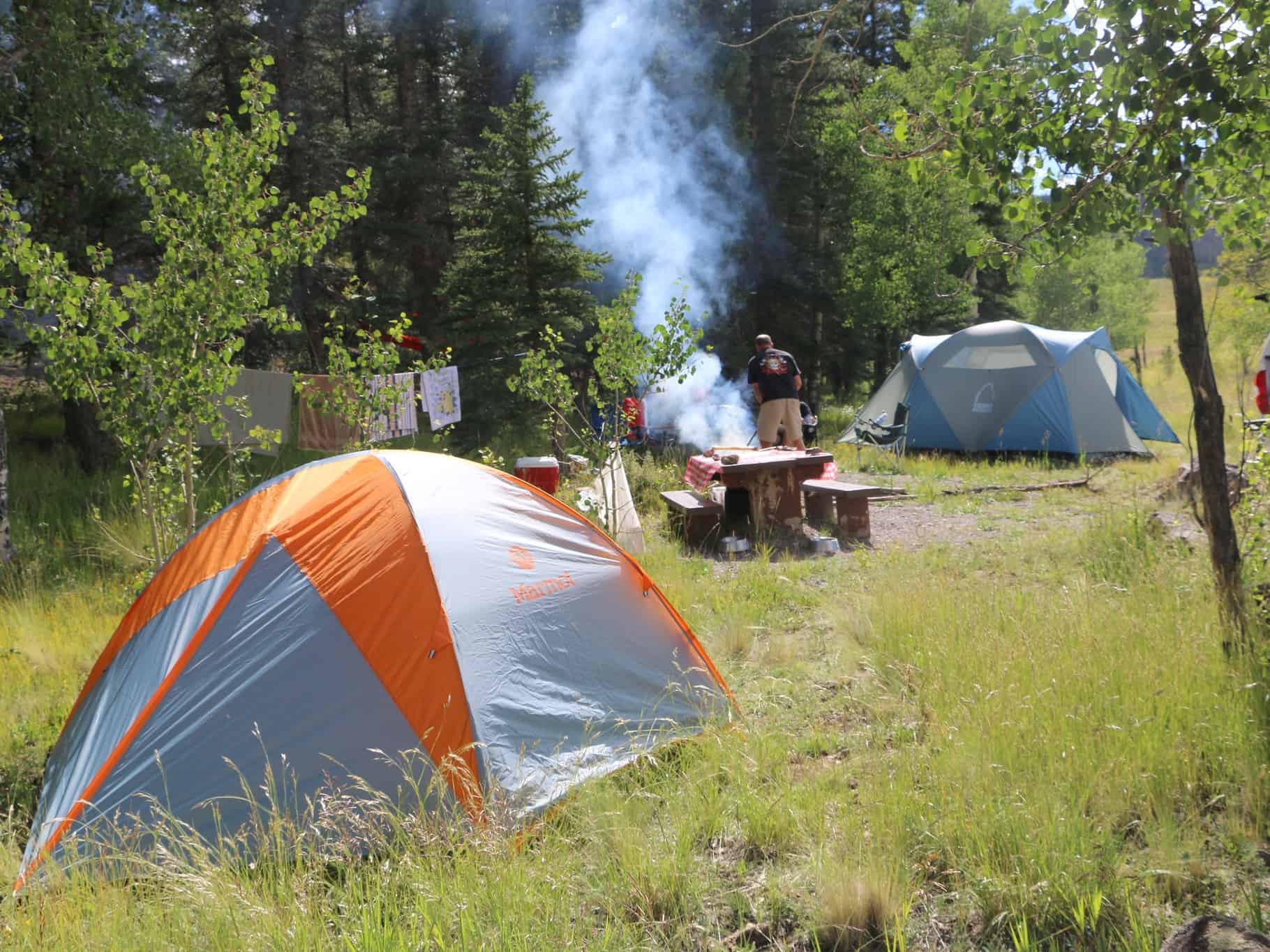Last updated on January 19th, 2023 at 05:04 pm
Your weekend camping trip was a blast, but now you have this noxious smell of campfire smoke permeating your tent. You certainly don’t want to pack it away with its current stench. But how do you get rid of the putrid odor? No worries! We’ll explain how to get campfire smell out of your tent.
From airing it out to commercial cleaners, we have the answer to how to get campfire smell out of your tent.
1. Air it Out
Firstly, sometimes simply airing your tent out for a few days is all it takes. Depending on your living environment, this looks a bit different for everyone.
For instance, if you have a yard, set your tent up in the yard for a few days and open all the vents, doors, and windows.
Then, instead of attaching the fly, hang it on a close line instead. If you don’t have one, tie a rope between some trees or even across your garage.
Of course, the outdoors is best because the sun and breeze also helps evaporate the smell.
However, if you live in an apartment that’s probably not an option.
Hopefully, you at least have a balcony. If not, hang it over your shower rod or even a closet door will work. Ideally, you want good airflow on both sides of the tent for optimal results.
If you can’t make that happen, then flip the tent periodically to ensure both sides are exposed to fresh air.
Furthermore, if you’re air drying indoors, set up a fan to mimic an outdoor breeze. The added airflow helps disperse the smell.
Over time, it will subside. Sometimes the best answer to how to get campfire smell out of your tent is the simplest.
2. Enzyme Gear Cleaners
Alternatively, you can use a trusty enzyme gear cleaner. Enzyme cleaners are organic, biodegradable, and environmentally friendly. So, you don’t have to worry about any harmful residue.
This gives you the added comfort of knowing it’s safe for both your kids and pets.
Furthermore, enzyme cleaners are specifically designed to attack and eliminate those obnoxious odors.
Our favorites are Gear Aid, Nikwax Tech Wash, and Nixwax Tent and Gear Solarwash. Each functions slightly different from the other, but both operate under the same premise.
Before you use your enzyme cleaner, make sure to give your tent a thorough cleaning by following these steps.
- Make sure all food and garbage are removed from the inside.
- Debride any heavy debris, like mud, from the tent walls and floor as necessary.
- Open all vents, doors, and windows.
To use Gear Aid,
- Fill a large container with cold to warm water. A kiddie pool is usually a nice size and large enough for your tent. Likewise, you can also use your laundry sink or bathtub.
- For every 75 liters of water, add 30 milliliters of gear cleaner.
- Submerge your tent thoroughly and let it soak for five minutes. You can also rub a soft cloth over your tent fabric for a more thorough cleaning.
- Remove your tent from the solution, set it up, and allow it to dry.
To use Nixwax,
- Erect the tent.
- Spray the cleaner evenly along the outside of the tent.
- Gently work in the spray with a damp sponge or cloth.
- Rinse with clean water.
- Allow to completely air dry before storing.
In all cases, it is imperative your tent is completely dry before storing away. Otherwise, you risk mold and mildew.

3. Baking Soda Paste
In addition, many campers prefer to use a baking soda paste that they can rub into their tent. In fact, baking soda, or sodium bicarbonate, has been used as the miracle cure for odors for decades.
Remember, all odors are essentially volatile molecules. As such, they are looking to attach themselves to something, and in most cases opposites attract. Odor neutralizers like baking soda are just that.
Whereas, enzyme cleaners rid the air of smells, neutralizers attach themselves to the volatile molecules to cancel out the smell. Most offensive stinks are acidic in nature. Because baking soda is a base, it naturally voids the stench.
Bear in mind, to cover an entire tent, you’ll need a substantial amount.
To make a baking soda paste
- Mix three parts baking soda with one part water.
- Spread a thin layer of paste over your tent and work it into the fibers with a soft toothbrush or sponge. Be gentle so as not to destroy your tent fibers.
- Let the paste dry until it returns to a powder. This usually takes at least an hour or two.
- Once dried, shake the tent vigorously to remove the baking soda from the fabric pores. Then vacuum all the baking powder dust.
- Repeat as necessary.
As an added boost, try adding a bit of vinegar to your paste. It’ll fizz the smell right out of your tent.

4. Citrus Spray
Another option many campers love is a citrus spray to rid those smokey smells. Not only does citric acid naturally deodorize, but it’s also mild enough that it doesn’t damage your tent like harsh chemicals. Additionally, we understand, those wondering how to get campfire smell out of your tent are usually very scent sensitive. So, we like this method that helps you be proactive throughout your trip.
Simply zest some citrus fruit and simmer it in warm water for approximately 30 minutes. Then pour the mixture into a spray bottle. However, avoid the juice of your fruit, you wouldn’t want uninvited ants on your next trip.
Citrus fruits include
- Lemon
- Lime
- Grapefruit
- Orange
- Kumquat
- Tangerine
Alternatively, you can use citrus essential oils, which are concentrated chemical compounds from citrus plants.
In fact, you can add 15 to 20 drops of essential oils for each ounce of water and achieve the same results.
Spray both the inside and outside of the tent while it’s erected and let it dry.
This is by far one of the easiest methods to utilize.
As well, there are many advantages to using citrus sprays for alleviating smokey odors:
- You can spray your tent down before you break camp saving labor time on the other end.
- The mist dries exceptionally fast making this one of the quickest and easiest methods to use.
- Not only does it rid your tent of the unpleasant smell, but it replaces it with a pleasant aroma. So, your tent smells nice and fresh on your next adventure.
- Citrus smells not only enhance the smell of your tent, they are also known for enhancing your mood.
- Plus, many citrus fruits and essential oils are also antimicrobial and antifungal, which can prevent the growth of mold and mildew.
5. Apple Cider Vinegar Spray
Along the same lines, another quick and easy favorite is spraying your tent with Apple Cider Vinegar (ACV). Just like a citrus spray, this too is something that can be done before you break camp.
Spray your mixture over the tent walls, both inside and out, and then let it dry. Because sprays are quick to dry, they are indeed the favorites among most campers.
However, it’s always best to err on the side of caution. So, give yourself at least an hour before packing your tent away.
Likewise, white vinegar can also be used. It’s actually stronger and more acetic than apple cider vinegar, but ACV certainly smells a little better.
Both types of vinegar are considered acetic acids, which are known for bonding easily with volatile molecules. As such, they do a great job of neutralizing and deodorizing noxious smells.
Mix your choice of two parts vinegar to one part warm water. Some campers recommend a 1:1 ratio.
My personal favorite recipe combines:
- 1 cup vinegar
- ½ cup warm water
- 1 Tbsp baking soda
- 15-20 drops of lemon or grapefruit essential oil
Let the fizz wear off, then pour in a spray bottle, and spray down your tent. Let it air dry for at least an hour before packing it away.
This triple-action spray both deodorizes and neutralizes the smoke, plus you get the added bonus of the antifungal, antibacterial properties.
Additionally, if you can’t stand the smell of vinegar, the pleasant aroma of the essential oil is much more tolerable.

6. Soak it
Additionally, soaking the smells out is another option. Now, unless you simply don’t have a choice, tent soaks are definitely something preferably done outside.
While the soak itself isn’t messy, removing the tent will produce an exorbitant amount of water, so lay some ground barriers to keep your floor from getting drenched.
There are several methods and soaks that can be tried.
Dish Soap and Water Soak
For overly stubborn offensives, sometimes an old-fashioned soak is what it takes. Although it’s not an easy task, it’s sometimes the most efficient method of alleviating unwanted smells.
To soak and bathe your tent with dish soap:
- Perform any necessary precleaning (trash, excessive mud, etc. )
- Grab the kiddie pool (or use your bathtub), and fill it with dish soapy, preferably warm, water.
- Spot-clean any exceptionally dirty areas with a sponge and soap. Then, turn your tent inside out and completely submerge it into the bath water. Gently stir it around a bit to ensure all areas are getting penetrated.
- Let it soak for at least ten to fifteen minutes.
- Drain the water, and refill for rinsing. Repeat this step as many times as necessary until all the soap has been rinsed away.
- Once your tent is completely rinsed, pitch it and let it air dry.
As already mentioned, be sure your tent is 100% dry before packing it away. This could take several days, so make sure you check the weather.
OxiClean or Biz
Alternatively, if you’d rather try a commercialized cleaner, Oxiclean or Biz are time tested and effective. In fact, these cleaners predominantly contain sodium percarbonate (oxygen bleach), which is a surfactant, which means they attach themselves to stains and smells at the same time.
Similar to hydrogen peroxide, the bubbles help lift the debris and odors right out of your tent’s fabric.
It’s important to exercise a bit more caution when using commercialized cleaners. These surfactants are known to irritate the skin, lungs, and eyes. So as with any chemical cleaner, it’s better to wear gloves.
At any rate, you can mix half a cup of cleaner with a gallon of warm water. Depending on the intensity of the smell, let your tent soak anywhere from one to four hours.
As with the dish soap and water method, following the soak, you’ll need to erect your tent and let it dry.
Vinegar Bath
However, if you’d rather avoid the harsh chemicals of commercialized cleaners, you can use vinegar instead. As before, mix two parts vinegar to one part water.
It is very similar to a vinegar spray, but for overly offensive smells, a soak may be more efficient.
Submerge your tent in the mixture, then let it soak for around two to three hours. Once removed from the solution, you’ll need to let it dry out for a few days.
For a more potent mix, add a little lemon juice to your mixture, which will also get rid of any harmful bacteria.
The most important thing to remember is that tents cannot handle a great deal of scrubbing, so be gentle with your baths. You don’t want to damage the structural integrity of your tent.

7. Freeze it
Albeit an unconventional method, some campers swear by removing the smoke scent through freezing. If you’ve got room in a deep freezer, throw in your tent for a few days.
Because odors are volatile molecules they can quickly turn into a gas. The cold air from the freezer causes the molecules to do just that allowing the smell to dissipate over time.
Coincidentally, it’s also a great way to kill any bugs or insects that may have taken up residence in your tent. However, we suggest a thorough vacuuming to remove insects and debris prior to tossing it around your kitchen.
Additionally, check out our post on the Best Tent for Hot Weather to find a great tent that could act as a backup while you’re freezing or treating your smoke-laden one.
8. Dryer Sheets
By design, dryer sheets improve the smell of just about anything. The chemicals in the dryer sheets react with the smoke molecules to help neutralize and cover up odors.
Simply use your dryer sheet like a cloth and wipe down your tent both inside and out. Like some of our other hacks, doing this before you break camp can save you some work on the other end.

Henceforth, add dryer sheets to your camping pack list. So when other campers ask how to get campfire smell out of your tent, it’s a cheap easy fix that also serves lots of other purposes around camp.
Even better, once you’ve wiped down your tent and packed it away, toss an additional sheet into your storage bag. This way, the next time you use your tent it’ll have that fresh spring scent.
Personally, we shy away from dryer sheets due to their environmental impact. We’re more of a wool dryer ball family. However, if you have some laying around they’ll serve you well in your camping pack. Especially since they can also be used to fend off mosquitos.
Take the Time to Treat
Finally, once you’ve taken the opportunity to clean your tent and set it up for drying, don’t waste a good opportunity.
Now’s the perfect time to give your tent a thorough once-over. Inspect it for any tears, broken components, busted zippers, or missing parts at the same time.
Thoroughly check all of your seams, especially around the floor where water can penetrate. Since vigorous scrubbing can weaken your seam tape, inspect all of them carefully to ensure they don’t need to be resealed.
Also, double-check all of your door and window zippers to ensure they remain in working order.
It would certainly be better to find and repair any unexpected rips or leaks at this juncture rather than your next camping trip.
Breathe a Sigh of Relief
If you’re stuck with the question ‘how to get campfire smell out of your tent,’ it’s likely that you’ve just arrived home from an amazing adventure. First, welcome home, we hope you made lots of amazing memories! However, we understand the lingering memory of a campfire can saturate everything and can even trigger migraine symptoms. So, we’re here for you.
Understand it may be necessary to give your tent more than one treatment to fully eradicate the campfire smell. Sometimes, a combination of methods works best. For example, give your tent a spray before leaving camp, and then toss in a dryer sheet when storing your gear.
Once you find a method you like, it becomes a much easier process that simply becomes part of your camping routine. These hacks are a great way to get your tent smelling fresh in no time. You can even try these methods on your other camping gear too.
About the Author
Sarah Sampsell
Title Image Credit, How to Get Campfire Smell Out of Your Tent: Peter Mooney | (source) | Public Domain Mark 1.0 — reduced file size and image
How to Get Campfire Smell Out of Your Tent, Image Credit 1: Mads Bødker | (source) | Attribution 2.0 Generic (CC BY 2.0) — reduced file size and image
How to Get Campfire Smell Out of Your Tent, Image Credit 2: resakse | (source) | Attribution-NoDerivs 2.0 Generic (CC BY-ND 2.0) — reduced file size and image
Image Credit 3, How to Get Campfire Smell Out of Your Tent: Ben Sutherland | (source) | Attribution 2.0 Generic (CC BY 2.0)— reduced file size and image
How to Get Campfire Smell Out of Your Tent, Image Credit 4: Nenad Stojkovic | (source) | Attribution 2.0 Generic (CC BY 2.0) — reduced file size and image
How to Get Campfire Smell Out of Your Tent, Image Credit 5: Max Lee | (source) | Attribution 2.0 Generic (CC BY 2.0) — reduced file size and image

